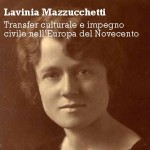
UN CONVEGNO SU LAVINIA MAZZUCCHETTI di Gianfranco Petrillo | Quello di Lavinia Mazzucchetti (1889-1965) è un nome mitico, sia per i germanisti italiani sia per chi si occupa di storia dell’editoria. Ma non è che se ne sappia molto. Bene ha fatto quindi la (noi questo articolo, soppresso per calco anglofilo ormai sia nei media sia dagli stessi operatori, insistiamo a usarlo) Fondazione Arnoldo e Alberto Mondadori a mettere insieme un “Laboratorio Mazzucchetti”, in collaborazione con le Università di Catania e Verona, l’Istituto italiano di studi germanici e il Goethe Institut, rappresentati da Massimo Bonifazio, Luisa Finocchi, Arturo Larcati, Mario Rubino e Michele Sisto.